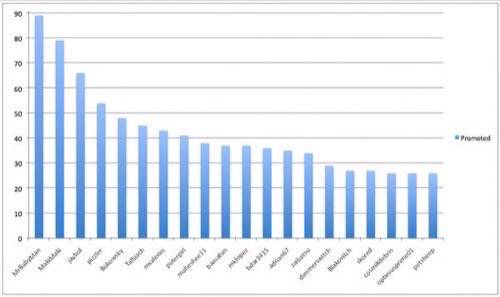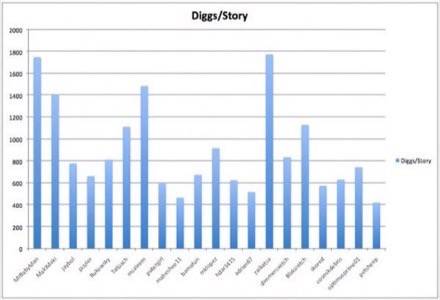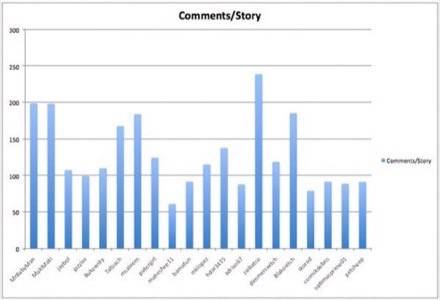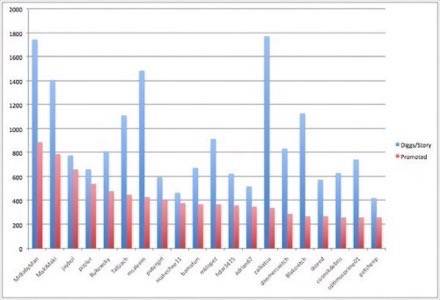If you’re even peripherally involved in the social news space you are
probably familiar with the rather rocky relationship that Digg has
with its core community. Fueled partly by a need to counter false
accusations from disgruntled community members who claim that Digg is
rigged (i.e. that a core group of users decide what content is promoted), partly by the desire to encourage non-core members to participate
more passionately, and partly by a need to affect a level of diversity and
equality that would appear promising to potential acquirers, Digg has
changed its algorithm again and again to artificially favor certain
categories over others (i.e. world news and politics over technology)
and to favor relatively new users over long-time, active users.

This is a guest post by Muhammad Saleem, a social media consultant and a top-ranked community member on multiple social news sites.
Let me assure you that this is not just another rant
about how top users aren’t being treated fairly. This post isn’t about top users or new users, it is purely about
the quality of the content on the front page of Digg, and the
causes for the decline in the quality of that content. Chief among those causes is the lack of
transparency and the imbalance in the algorithm that favors certain
users over others and ultimately results in diversity, but poorer (if not poor) content. To understand the change
and the effects of the change I analyzed the available data on
different users’ submitting habits, the Digg algorithm’s promotion
habits, and the reaction of the community to the content that is
ultimately promoted.
The metrics used to gauge content popularity are quite
straightforward: the absolute number of Diggs per story and the
absolute number of comments per story. The Diggs determine how many
other community members – the ones that don’t vote to make the story
popular but find it worthwhile once it is promoted – like a story, and
the comments determine how much engagement and conversation apart from
Digging, the story generates. The data used here is for the 20 most
prolific users but when I tested for the top 50 the results were
similar.
Let’s first look at the user rankings based purely in terms of the
number of stories promoted in a 30 day period. The users are ranked so
that the person with the most number of stories promoted appears first
and the one with the least number of stories promoted appears last,
the idea being that the person with the most quality content gets the
most attention, or more appropriately, that person’s content gets the
most attention (the most basic principle behind all of Digg and the
content promotion algorithm). The ranking is as follows:

Now let’s look at the same rankings (i.e., users are ranked by
the number of stories promoted), but look at how many Diggs an average
story from those users gets once it is promoted. If the algorithm
works well in determining quality and is not flawed or artificially
helping some users over others, the graph should be exactly the same
as above and the people with the most stories promoted are also the
people that get the most Diggs per story (because the algorithm is
only promoting the best of the best and nothing else).

As you can see, the graph is not the same. What you see on the
other hand is that there are some users whose stories are promoted more
frequently even though they don’t perform as well, while there are
other users whose stories consistently out perform but
aren’t promoted as frequently. What this means is that some users have an easier
time getting their content promoted (for whatever reason) but once the content does
get promoted, it largely falls flat on the front page.
Now let’s look at how the promoted content engages the community in
conversation. Again the users are ranked by the number of stories they
got promoted (as in the first graph).

Again you can see that some users have an easier time getting their
content promoted to the front page but once the content gets there,
people aren’t really that interested in talking about it. Others, however, have content that everyone has
something to say about (even though the algorithm won’t let them get stories on
the front page as often)
And finally, let’s look at the number of stories promoted and the
number of Diggs received per story (average) on the same chart (note I
had to multiply the promotion data by 10 so the graph would be visible
compared to the Diggs per story):

As you can see there is a huge disparity in the number of stories
promoted and how viral those stories go. Ultimately, what’s happening
is that people whose stories almost always get 1200+ Diggs are getting
throttled (for whatever reason) whereas people whose stories are
routinely getting under 1000 Diggs once promoted, are being favored. It doesn’t matter if we’re taking about top users or not, because the end result is that lower quality content is promoted to the front
page more often than content that performs better after promotion. Case in point,
why is it that user “zaibatsu” – whose average Digg-per-story number
out paces any Digg user in history (1775 Diggs per story)
– gets on average only one story promoted per day while users getting
less than 700 Diggs per story get promoted multiple times per day?
Note: This isn’t meant as an attack on any user and his or her submissions. All the users mentioned and displayed on the graphs are my friends and I respect their submissions. This post is just meant to point out the flaws of Digg’s content promotion algorithm.










